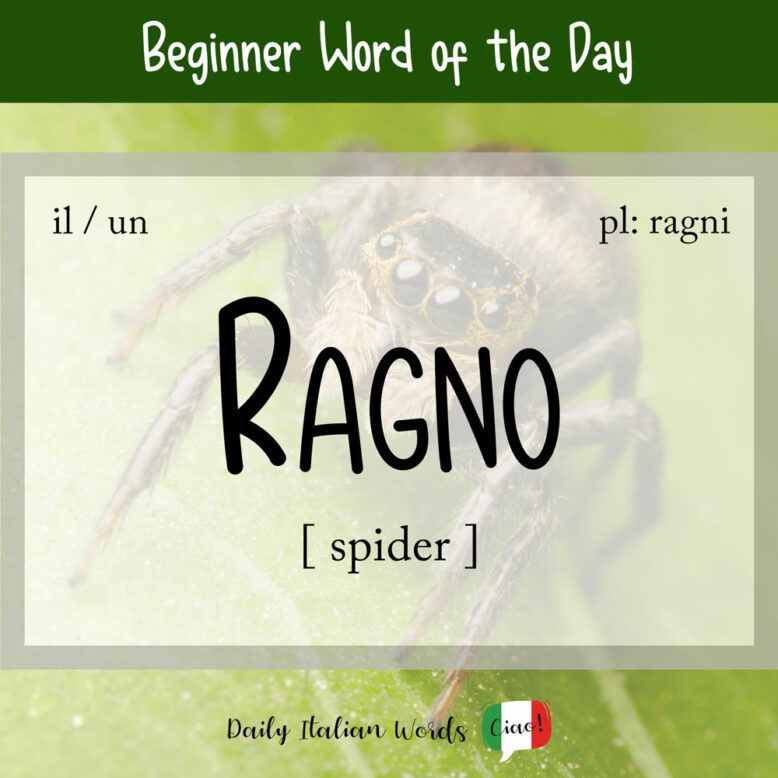Arachnophobia, or the fear of spiders, is one of the oldest and most common phobias in the world. This word and ragno (masculine, plural: ragni), the Italian word for spider, are both derived from the ancient Greek word arachne.

It is estimated that approximately 1,600 types of spider exist in Italy, with the most common species being the ragno crociato (European garden spider), ragno delle case (domestic house spider) and ragno d’acqua dolce (water spider). The vast majority are perfectly harmless, but there are a couple to watch out for: the venomous ragno violino (violin spider) and the tarantola (tarantula).
Mia zia ha la fobia dei ragni.
My aunt has arachnophobia.

There are two possible translations for spiderweb in Italian: tela di ragno or ragnatela. They mean exactly the same thing, though you may hear the latter more often.
Whereas an English mother might describe her lanky child as being as skinny as a rake, an Italian mother would say sembra un ragno (he/she looks like a spider).
Mio figlio è così magro che sembra un ragno!
My son is so skinny he looks like a spider!
An expression worth learning in Italian is non cavare un ragno dal buco (to not get a spider out of the hole). It is used when you are unsuccessful at obtaining a result despite making a concerted effort.
Nonostante le sue indagini segrete, non cavò un ragno dal buco.
Despite his secret investigations, he couldn’t find anything.
Of course, no article about spiders would be complete if we didn’t at least mention the legendary Uomo Ragno (Spider-Man)!

Below you can listen to a very famous song by the Italian band 883 called Hanno Ucciso l’Uomo Ragno (They’ve Killed Spider-Man).
Solita notte da lupi nel Bronx
Nel locale stan suonando un blues degli Stones
Loschi individui al bancone del bar
Pieni di whisky e margaridas
Tutto ad un tratto la porta fa “slam”
Il guercio entra di corsa con una novità
Dritta sicura si mormora che
I cannoni hanno fatto “bang”
Hanno ucciso l’uomo ragno
Chi sia stato non si sa
Forse quelli della mala, forse la pubblicità
Hanno ucciso l’uomo ragno
Non si sa neanche il perché
Avrà fatto qualche sgarro a qualche industria di caffè
Alla centrale della polizia
Il commissario dice “che volete che sia”
Quel che è successo non ci fermerà
Il crimine non vincerà
Ma nelle strade c’è il panico ormai
Nessuno esce di casa, nessuno vuole guai
Ed agli appelli alla calma in TV
Adesso chi ci crede più
Giù nelle strade si vedono gangs
Di ragionieri in doppio petto pieni di stress
Se non ti vendo mi venderai tu
Per cento lire o poco più
Le facce di Vogue sono miti per noi
Attori troppo belli sono gli unici eroi
Invece lui sì, lui era una star, ma tanto non ritornerà
A usual dark and stormy night in the Bronx
A blues song by the Stones is playing in the club
Shady individuals at the bar counter
Full of whiskey and margaritas
All of a sudden the door goes “slam”
The one-eyed man rushes in with some news
Straight safe he murmurs that
the cannons have gone “bang”:
They killed Spider-Man
No one knows who did it
Maybe the bad ones, maybe the ad industry
They killed Spider-Man
We don’t even know why
He must have insulted some coffee company
At the police station
The commissioner says “it’s no big deal”
What happened will not stop us
Crime will not win
But in the streets there is panic now
Nobody leaves the house, nobody wants trouble
And now no one believes the calls for calm on the TV
Gangs can be seen down the streets
Of double-breasted accountants full of stress
If I don’t sell you out, you will sell me out
For one hundred lire or a little more
For us, the faces of Vogue are legends
Excessively beautiful actors are the only heroes
But as for him, yes, he was a star, but he will not return
Heather Broster is a graduate with honours in linguistics from the University of Western Ontario. She is an aspiring polyglot, proficient in English and Italian, as well as Japanese, Welsh, and French to varying degrees of fluency. Originally from Toronto, Heather has resided in various countries, notably Italy for a period of six years. Her primary focus lies in the fields of language acquisition, education, and bilingual instruction.


